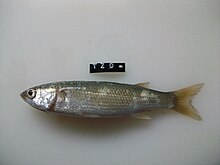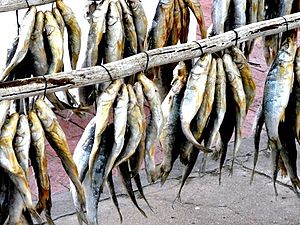South African mullet
Appearance
(Redirected from Liza richardsonii)
| South African mullet | |
|---|---|

| |
| Scientific classification | |
| Domain: | Eukaryota |
| Kingdom: | Animalia |
| Phylum: | Chordata |
| Class: | Actinopterygii |
| Order: | Mugiliformes |
| Family: | Mugilidae |
| Genus: | Chelon |
| Species: | C. richardsonii
|
| Binomial name | |
| Chelon richardsonii (A. Smith, 1846)
| |
| Synonyms[1] | |
| |


The South African mullet (Chelon richardsonii), also called a harder mullet or simply harder, is a species of mullet. It is found in South African coastal waters from Walvis Bay (Namibia) to KwaZulu-Natal, and grows to a maximum length of 40.5 cm (15.9 in).[2] The person the specific name honours was not recorded by Andrew Smith when he described this species but it is most likely to be John Richardson (1787-1865), the Scottish naturalist, surgeon and Arctic explorer.[3]
It is also found inland in the waters of the Olifants River (Western Cape).[4]
Local delicacy in South Africa
[edit]Mullet fish caught in the sea and estuaries of the West Coast region are processed by salting and air-drying into bokkoms by small local factories around Velddrif and Laaiplek.[4]
See also
[edit]- The common name "harder mullet" in Germany refers to the flathead mullet, Mugil cephalus.[2]
- The USS Harder (SS-257), a World War II era naval ship that was named after the fish.
References
[edit]- ^ Eschmeyer, William N.; Fricke, Ron & van der Laan, Richard (eds.). "Mugil richardsonii". Catalog of Fishes. California Academy of Sciences. Retrieved 29 October 2018.
- ^ a b Froese, Rainer; Pauly, Daniel (eds.). "Chelon richardsonii". FishBase. May 2006 version.
- ^ Christopher Scharpf & Kenneth J. Lazara (17 September 2022). "Order MUGILIFORMES (Mullets)". The ETYFish Project Fish Name Etymology Database. v. 4.0. Christopher Scharpf and Kenneth J. Lazara. Retrieved 26 April 2024.
- ^ a b Tayla Susan Louw (August 2020). An exploration of the post-harvest activities of the Olifants Estuary Small-Scale Fishery: Recommendations for equitable market access and beneficiation (Thesis). University of Cape Town.
